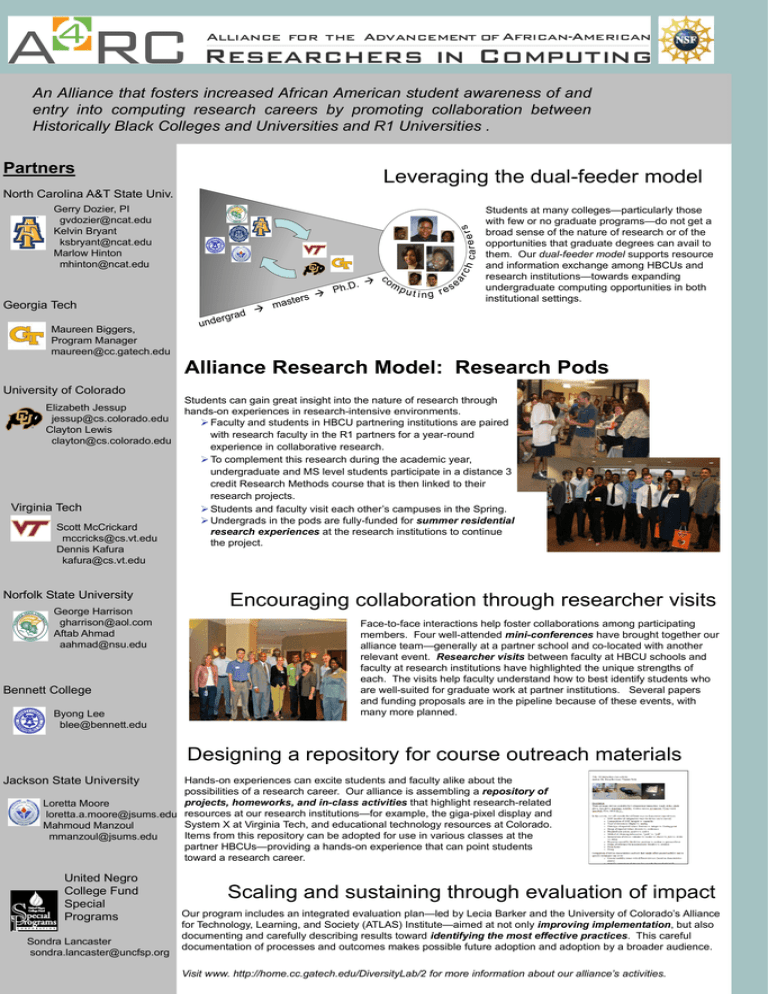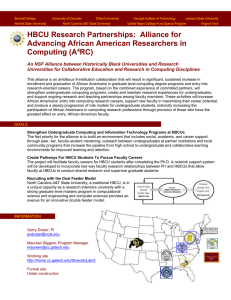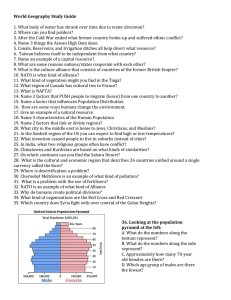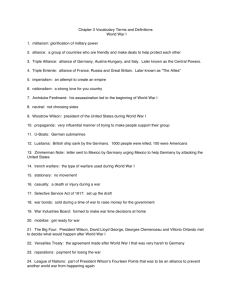hbcualliance-poster02-11-08.ppt: uploaded 11 February 2008 at 5:34 pm
advertisement

An Alliance that fosters increased African American student awareness of and entry into computing research careers by promoting collaboration between Historically Black Colleges and Universities and R1 Universities . Partners Leveraging the dual-feeder model North Carolina A&T State Univ. r Gerry Dozier, PI gvdozier@ncat.edu Kelvin Bryant ksbryant@ncat.edu Marlow Hinton mhinton@ncat.edu n Georgia Tech Students at many colleges—particularly those with few or no graduate programs—do not get a broad sense of the nature of research or of the opportunities that graduate degrees can avail to them. Our dual-feeder model supports resource and information exchange among HBCUs and research institutions—towards expanding undergraduate computing opportunities in both institutional settings. Maureen Biggers, Program Manager maureen@cc.gatech.edu Alliance Research Model: Research Pods University of Colorado Elizabeth Jessup jessup@cs.colorado.edu Clayton Lewis clayton@cs.colorado.edu Virginia Tech Scott McCrickard mccricks@cs.vt.edu Dennis Kafura kafura@cs.vt.edu Norfolk State University George Harrison gharrison@aol.com Aftab Ahmad aahmad@nsu.edu Bennett College Byong Lee blee@bennett.edu Students can gain great insight into the nature of research through hands-on experiences in research-intensive environments. Faculty and students in HBCU partnering institutions are paired with research faculty in the R1 partners for a year-round experience in collaborative research. To complement this research during the academic year, undergraduate and MS level students participate in a distance 3 credit Research Methods course that is then linked to their research projects. Students and faculty visit each other’s campuses in the Spring. Undergrads in the pods are fully-funded for summer residential research experiences at the research institutions to continue the project. Encouraging collaboration through researcher visits Face-to-face interactions help foster collaborations among participating members. Four well-attended mini-conferences have brought together our alliance team—generally at a partner school and co-located with another relevant event. Researcher visits between faculty at HBCU schools and faculty at research institutions have highlighted the unique strengths of each. The visits help faculty understand how to best identify students who are well-suited for graduate work at partner institutions. Several papers and funding proposals are in the pipeline because of these events, with many more planned. Designing a repository for course outreach materials Jackson State University Hands-on experiences can excite students and faculty alike about the possibilities of a research career. Our alliance is assembling a repository of projects, homeworks, and in-class activities that highlight research-related Loretta Moore loretta.a.moore@jsums.edu resources at our research institutions—for example, the giga-pixel display and System X at Virginia Tech, and educational technology resources at Colorado. Mahmoud Manzoul Items from this repository can be adopted for use in various classes at the mmanzoul@jsums.edu partner HBCUs—providing a hands-on experience that can point students toward a research career. United Negro College Fund Special Programs Sondra Lancaster sondra.lancaster@uncfsp.org Scaling and sustaining through evaluation of impact Our program includes an integrated evaluation plan—led by Lecia Barker and the University of Colorado’s Alliance for Technology, Learning, and Society (ATLAS) Institute—aimed at not only improving implementation, but also documenting and carefully describing results toward identifying the most effective practices. This careful documentation of processes and outcomes makes possible future adoption and adoption by a broader audience. Visit www. http://home.cc.gatech.edu/DiversityLab/2 for more information about our alliance’s activities.



